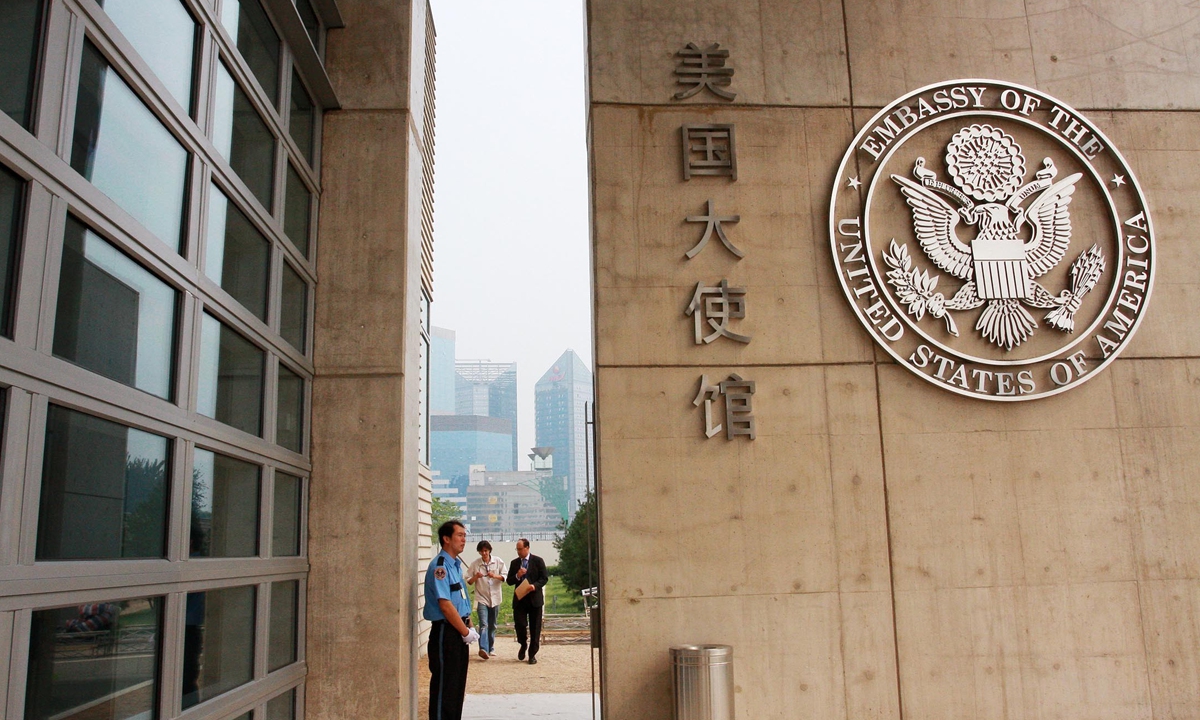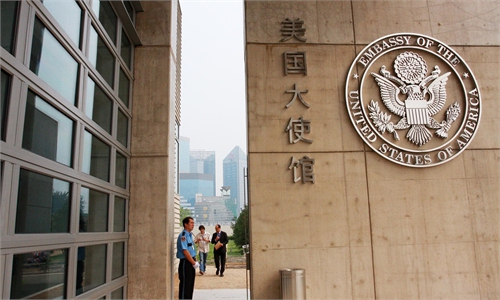
US Embassy in China Photo: cnsphoto
Nicholas Burns, a career diplomat, is in the final stages of vetting to serve as US ambassador to China. Burns could be among the first batch of diplomatic nominees announced in the coming weeks, according to AXIOS on Friday.
Burns is an ideal choice for the position of US ambassador to China. Although he did not hold a specific position on China-related issues during his tenure at the State Department, he has extensive diplomatic experience and is familiar with Chinese affairs. He has served as Undersecretary of State for political affairs for President George W. Bush, US Ambassador to NATO (2001-05), Ambassador to Greece (1997-2001) and State Department spokesperson (1995-97). After leaving the State Department, Burns also has worked for think tanks and Harvard University, still staying close in policy circles. All these positions require a profound understanding of China-related affairs.
As an experienced diplomat, Burns' ability to communicate with various US agencies also makes him a competitive candidate. He is familiar with most designated officials in Biden's administration, and the fine working relationship could help coordinate efficiently.
Burns' view on China is not as extreme as that held by the former Trump administration. While defending the rhetoric of "competition" with China in the US strategic system, he also stressed that the US can't decouple or delink from China and there is a need for cooperation on some China-related issues. Given his views on China that are not extreme, it's unlikely China will be averse to him. It should be said that Biden's choice of Burns is very reasonable.
Biden's choice of Burns is a big change from the past, as he has chosen a veteran diplomat rather than elected officials. Burns works for Biden, who is a bit more rational than his predecessor. It can be expected that Burns will play a much bigger role than his predecessor in terms of US policy toward China.
It should be noted that Burns has made some harsh remarks about China. He said during a CNBC interview in 2017 that China was openly contesting US power in Asia. This indicates that the competition between China and the US has been a mainstay of Washington's policy toward Beijing. And that is unchangeable no matter who becomes the president, or who becomes the new ambassador to China. However, we cannot assume that Burns would lead to further deteriorations in China-US relations because he had made unfriendly remarks toward China. Nor should we think this because of the competition between China and the US already being so serious.
US State Department spokesperson Ned Price said in a February press briefing that the, "[US] ambassador will be responsible for helping to steward an approach to China that has competition at the center." China should understand that Burns' main duty as ambassador to China is to implement the Biden administration's China policy, and he won't reverse the existing policy. However, Burns could offer the Biden administration some advice on specific issues with flexibility and make their China policy more pragmatic.
"Burns seems like the most logical and likely choice, bringing diplomatic stature and an understanding of the complexity of the relationship - but also of the limitations of the role," wrote Michael Hirson, Asia head with the Eurasia Group and a former US financial attache to China. This limitation is manifested in three aspects: First, China's position as a strategic competitor and global competitor has been fixed and the climate of US policy has changed during the past four years. As a result, the odds of expecting an ambassador to make any breakthroughs are low.
Second, Burns, as the most likely candidate, is 65-years old, which means he may not have the stamina to effectively handle the complex challenges that exist between China and the US.
In addition, Burns has served in both Republican and Democratic administrations. The very serious opposition between political parties in the US limits the country not only in dealing with its own domestic issues, but also in the planning and implementation of its China policy. In other words, Burns' limitations on China-related issues are correlated with that of the Biden administration.
Lastly, Burns has relatively extensive diplomatic experience in dealing with Europe, so he may approach China in the way he has been relatively successful in dealing with Europe. However, Europe is not China. The national conditions and interests of European countries are different from that in China.
If he simply applies European conditions to Asia to handle state relations after taking office, his understanding of China may result in bias.
The author is professor at the Institute of International Relations of the China Foreign Affairs University. opinion@globaltimes.com.cn

